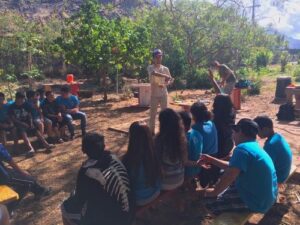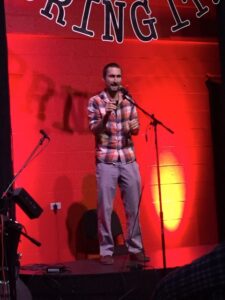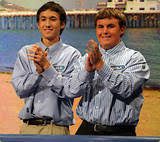In "Partner Perspectives" we get to know the diverse people, roles, and views of wildfire management in the Pacific.
Name: Pablo Akira Beimler
Role: Community Outreach Coordinator
Organization: Hawaii Wildfire Management Organization (HWMO)
Pacific Fire Exchange (PFX): What sparked your interest in wildfire?
Pablo (PAB): I was going to school at UC Berkeley and originally on the Business School track. It wasn’t really my scene so I switched to something more environmentally-focused - Environmental Economics.
One semester it was impossible for me to get into one last class to have enough units for the semester. About five weeks into the term I came across a Fire Ecology class. I didn’t know anything about fire but I just went for it. Because I was so behind in the class I got to work closely with the graduate student instructor, Kevin Krasnow, to catch up on the material.
The next semester Kevin asked me to help on a project counting tree rings, looking at fire scars and dating when those fires occurred. After that I decided to go to Forestry Camp, which is a summer in the field through University of California. It was probably the best learning experience I’ve had, and it was one of the best social experiences too. From then on I was geared toward environmental management and conservation with a focus on fire.
PFX: Describe your role at Hawaii Wildfire.
PAB: My position is the Community Outreach Coordinator. My main job is to raise awareness in people about wildfire. Building off that awareness, I find ways to engage people and communities to be more proactive and work together on projects. It’s evolved over the years so that now I provide training, ideas, resources, and expertise to communities. The hope is that I’m giving them enough of a boost so that they will eventually have self-sustained wildfire preparedness and prevention in their communities.
It entails a lot of persistence with the communities and other partners involved. That can be really tricky because a lot of our partners can be very busy with other things, and wildfire is not always the first thing on their agenda.
I think this position is challenging and fun because it’s totally new to Hawaii. It’s nice to know, though, that there’s a huge community of people doing similar work in the U.S. and other parts of the world. Often they are called Wildland-Urban Interface (WUI) Coordinators or Professionals. We all connect through the Fire-Adapted Communities Learning Network or the WUI Conference, and on social media too.
“Kahikinui is a nice example of fire-adapted community - which is about bringing all the different stakeholders to the same table, and where everyone shares a responsibility and plays a role in fire management.”
PFX: Share an experience partnering with others to reach a resource management goal.
PAB: Kahikinui on Maui, on the leeward side of Haleakala, is a remote homestead community that’s had some major close calls with fires. They had a lot working against them out there - lacking good roads and not much vegetative management. In the last couple years PFX and HWMO teamed up with Leeward Haleakala Watershed Restoration Partnership (LHWRP) to hold a fire-focused field tour out there. It was a really great way to bring all the different partners in the area to come not just for support and learning, but to talk about action steps. It served as a launching pad for new relationships and as an avenue for the Kahikinui community and Department of Hawaiian Home Lands (DHHL) to engage with each other more.
Since then the community has received funding from DHHL and the local wind company, Auwahi Wind, to help with their vegetative management projects. HWMO has been working with Kahikinui to become a Firewise Community and they’ve taken it upon themselves to meet monthly and have put in many hours of work. This is a small community - a couple dozen households - but they’re putting in just as much investment as some of Hawaii’s bigger Firewise communities. The next step that LHWRP wants to do is create a Community Wildfire Protection Plan (CWPP) for that entire region.
So Kahikinui is a nice example of a fire-adapted community - which is about bringing all the different stakeholders to the same table, and where everyone shares a responsibility and plays a role in fire management.
“How much is climate change going to impact fire in Hawaii and the Pacific?”
PFX: What unanswered questions do you have about wildfire?
PAB: To me, looking at the future is critical. A big question I have - and I know Clay Trauernicht is currently doing work on this - is “How much is climate change going to impact fire in Hawaii and the Pacific?” We have a basic understanding that many areas are drying out, including some wet areas, and in simple terms, dryness tends to mean more fire.
It would be interesting to know what new areas will start having fires. We’ve had giant fires in what we consider to be green areas - like the 1901 Hamakua fire that burned 30,000 acres. Will Hilo or lower Puna become really fire-prone landscapes? What areas that we consider “green” now are going to turn “red” in the future, in terms of fire hazard?


PFX: Favorite way to spend your free time?
PAB: I’ve gotten really into spoken word and slam poetry over the last couple years and currently I’ve been on a big writing kick. I’m trying to refine my poetry and working on both the writing and performance aspects of it.
I use poetry as a platform for speaking my mind about the issues I care about. A lot of my stuff focuses on current events and social or environmental justice issues. But there’s some that I just have fun with, without having to worry about the state of the world. I have one just on avocados, and my love for them. It’s called “Nature’s Buttah”.

PFX: Share something most people don’t know about you.
PAB: I was on the show "Wheel of Fortune" when I was 17. My friend Benji and I were a duo team for “Best Friends Week”. We won! We made it all the way to the bonus round. We won a pretty good chunk of change, and also won a trip to the Caribbean. We went to Curacao and spent a week there, with an all expense paid trip.
The funny part is that our baseball team was just a block away from Sony Studios and so we’d go watch Jeopardy!, Wheel of Fortune, and King of Queens - just the whole set-up of shows that they film there. It was a fundraiser for the team, because the shows actually paid audience members to fill the seats. I learned a lot by watching Wheel of Fortune over and over again - and getting tired of it - after school. But it paid off in the end, because we luckily got on the show when my friend applied, and then we did pretty well.
